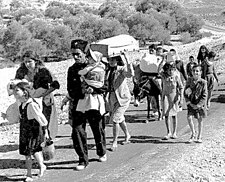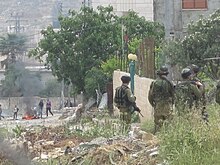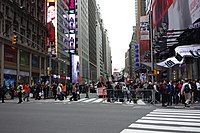Nakba Day
| Nakba Day | |
|---|---|
| Significance | Yom Ha'atzmaut |
 |
| Part of a series on the |
| Nakba |
|---|
Nakba Day (
The day was officially inaugurated by Yasser Arafat in 1998, though the date had been unofficially used for protests since as early as 1949.
Timing

Nakba Day is generally commemorated on 15 May, the day after the
Commemoration
As early as 1949, one year after the establishment of the State of Israel, 15 May was marked in several West Bank cities (under Jordanian rule) by demonstrations, strikes, the raising of black flags, and visits to the graves of people killed during the 1948 war. These events were organized by worker and student associations, cultural and sports clubs, scouts clubs, committees of refugees, and the Muslim Brotherhood. The speakers in these gatherings blamed the Arab governments and the Arab League for failing to "save Palestine", according to author Tamir Sorek. By the late 1950s, 15 May would be known in the Arab world as Palestine Day, mentioned by the media in Arab and Muslim countries as a day of international solidarity with Palestine.[5]
March of Return
Commemoration of the Nakba by Arab citizens of Israel who are
By the early 1990s, annual commemorations of the day by Palestinian Arab citizens of Israel held a prominent place in the community's public discourse.[6][9]
Other commemorations
Meron Benvenisti writes that it was "…Israeli Arabs who taught the residents of the territories to commemorate Nakba Day."[10] Palestinians in the occupied territories were called upon to commemorate 15 May as a day of national mourning by the Palestine Liberation Organization's United National Command of the Uprising during the First Intifada in 1988.[11] The day was inaugurated by Yasser Arafat in 1998.[12]
The event is often marked by speeches and rallies by Palestinians in Israel, the West Bank and Gaza, in Palestinian refugee camps in Arab states, and in other places around the world.[13][14] Protests at times develop into clashes between Palestinians and the Israel Defense Forces in the West Bank and Gaza Strip.[15][16][17] In 2003 and 2004, there were demonstrations in London[18] and New York City.[19] In 2002, Zochrot was established to organize events raising the awareness of the Nakba in Hebrew so as to bring Palestinians and Israelis closer to a true reconciliation. The name is the Hebrew feminine plural form of "remember".[6]
On
Objections to commemoration

Shlomo Avineri has criticised observance of Nakba Day on the grounds that a more important issue is the failure to solidify a stronger national movement for Palestinian citizens as a foundation for nation-building.[26][27] Arab citizens of Israel have also been admonished for observing Nakba Day in light of their higher standard of living when compared to that of Palestinians who reside outside of Israel.[28]
On 23 March 2011, the Knesset approved, by a vote of 37 to 25,[29] a change to the budget, giving the Israeli finance minister the discretion to reduce government funding to any non-governmental organization (NGO) that commemorates the Palestinian Nakba instead of the Israeli Day of Independence.[30][31] A previous form of the bill, which first came under consideration by the Knesset in July 2001 and again in 2006, established the commemoration of the Nakba Day as a criminal offense, subject to 1-year imprisonment and/or a fine of NIS10,000 (~$2,500). Palestinians argue that the bill imposes restrictions on freedom of speech and expression, curtails equality, and applies conditions that suppress the national consciousness and historical narrative of the Palestinian people.[32]
After months of legislative limbo due to numerous appeals filed by organizations such as Adalah and the Association for Civil Rights in Israel, as well as several Jewish and Arab citizens of Israel, the Supreme Court of Israel rejected the appeals, and upheld the Nakba Law, on 5 January 2012. Chief Justice Dorit Beinisch and Justices Eliezer Rivlin and Miriam Naor concluded: "The declarative level of the law does indeed raise difficult and complex questions. However, from the outset, the constitutionality of the law depends largely upon the interpretation given to the law's directives." Deductions could equal up to three times the event's sponsorship cost; repeat violations would double the amount of the fine.[33]
See also
- Naksa Day
- Al-Quds Day
- Day to Mark the Departure and Expulsion of Jews from the Arab Countries and Iran
- Farha (film)
- Ongoing Nakba
References
- ISBN 978-1-55862-472-6.
The Palestinian recalled their "Nakba Day", "catastrophe" – the displacement that accompanied the creation of the State of Israel – in 1948.
- ^ Hertz-Larowitz, Rachel (2003). Arab and Jewish Youth in Israel: Voicing National Injustice on Campus. Journal of Social Issues, 59(1), 51–66.
- Internally displaced Palestinians were not registered, among others. Factbox: Palestinian refugee statistics
- ^ Shuttleworth, Kate (15 May 2014). "In pictures: Nakba Day protests". Middle East Eye. Retrieved 8 August 2014.
- ISBN 978-0-8047-9520-3.
- ^ ISBN 978-1-84277-623-0.
- ISBN 978-0-520-25767-2.
nakba commemorations decades.
- ^ Masalha, 2005, p. 216.
- ^ In 2006, for example, Azmi Bishara, an Arab member of the Knesset told the Israeli newspaper Maariv: "Independence Day is your holiday, not ours. We mark this as the day of our Nakba, the tragedy that befell the Palestinian nation in 1948." (Maariv article (in Hebrew))
- ISBN 978-0-520-23825-1.
- ISBN 978-0-8156-2607-7.
May 15, which denotes the nakba, will be a day of national mourning and a general strike; public and private transportation will cease, and all will remain in their houses.
- ISBN 0-19-516689-2, p. 187.
- ^ "Anger over Palestinian Nakba ban proposal". BBC News. 25 May 2009. Retrieved 19 May 2010.
- ISBN 1-58826-202-2, p. 96.
- ^ Analysis: Why Palestinians are angry, BBC News Online, 15 May 2000.
- ^ Violence erupts in West Bank, BBC News Online, 15 May 2000.
- National Public Radio, 15 May 2000.
- ^ Pro-Palestine rally in London, BBC News Online, 15 May 2003.
- ^ Al-Nakba Day Rally in Times Square, 2004.
- ^ Gideon Biger (18 May 2011). "Israel was infiltrated, but no real borders were crossed". Haaretz. Retrieved 18 May 2011.
- ^ a b c Bloodshed along Israel borders kills 12 on Nakba Day AFP. 15 May 2011.
- ^ Israeli forces open fire at Palestinian protesters. BBC News. 15 May 2011.
- ^ Thousands of Palestinians mark 'Nakba Day'. BBC News. 15 May 2012.
- ^ Frykberg, Mel (15 May 2021). "Israeli forces wound dozens of Palestinians at Nakba Day marches". Al Jazeera English. Retrieved 15 May 2021.
- New York Times. Retrieved 15 May 2021.
- ^ The real Nakba by Shlomo Avineri, 5 September 2008
- ^ cf. Karsh, Efraim (10 June 2011). "Reclaiming a historical truth". Haaretz. Retrieved 11 August 2014.
- ^ "Time to stop mourning" by Meron Benvenisti
- ^ Knesset Approves Nakba Law, by Elad Benari, 23 March 2011
- ISBN 978-0-415-58861-4.
- ^ "MK Zahalka: Racist laws target Arab sector" by Roni Sofer, 22 March 2011
- S2CID 145339153.
- ^ "Israel's Supreme Court rejects Nakba Law suit " by The Jewish Telegraphic Agency, 5 January 2012



